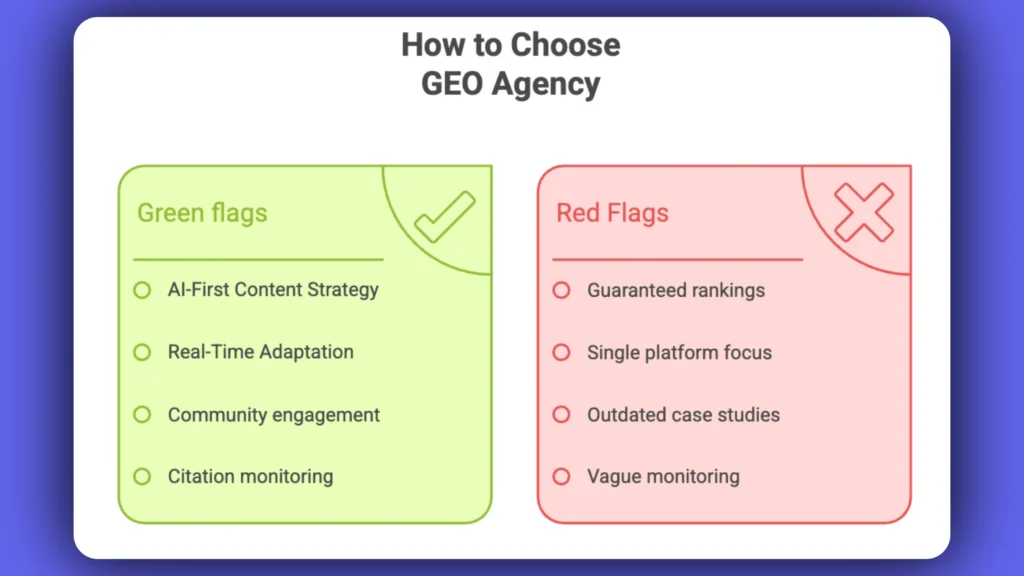Here’s the bottom line: businesses hire Generative Engine Optimization (GEO) agencies because traditional SEO only gets you so far when 40% of your audience is already asking ChatGPT, Perplexity, and Google’s AI overviews for answers. The right GEO agency doesn’t just optimize for search engines, they optimize for how AI models reference, understand, and recommend your brand.
If you’re running a growth-stage startup and your current marketing strategy doesn’t account for AI-powered search, you’re missing a massive opportunity to lower your customer acquisition cost (CAC) and reach prospects where they’re actually looking for solutions.
The AI Search Revolution Is Here (Whether You’re Ready or Not)
With AI-generated outputs, GEO means optimizing for what the model chooses to reference, not just whether or where you appear in traditional search. Think about your own behavior, when was the last time you scrolled past Google’s AI overview to click on organic results?
The shift is already happening:
- 58% of consumers now use AI chatbots for quick answers before making purchasing decisions
- Google’s AI overviews appear for 84% of queries in competitive industries
- ChatGPT processes over 100 million queries daily, many from your potential customers
This isn’t some distant future trend. GEO (generative engine optimization) is optimizing for generative AI tools, like ChatGPT and Perplexity. The engines may be changing, but the goal is the same, help answer users’ questions.
Why Startups Are Making the Move to GEO Agencies
1. Traditional SEO Agencies Are Playing Yesterday’s Game
Most SEO agencies still optimize for 2019 Google. They’re focused on keyword density, backlinks, and ranking positions, metrics that matter less when AI models synthesize information from multiple sources to generate answers.
A specialized GEO agency understands that Generative Engine Optimization (GEO) is a modern digital strategy aimed at enhancing the visibility and influence of content within responses generated by AI-driven platforms, such as ChatGPT, Claude, Gemini, Perplexity, and Google’s AI Overviews.
2. The Expertise Gap Is Real
Building effective GEO strategies requires understanding how Large Language Models (LLMs) process and weight information. This isn’t something you can figure out by reading a few blog posts. It requires:
- Understanding LLM training data preferences
- Creating content that AI models cite and reference
- Optimizing for context windows and token limits
- Building authority signals that generative engines recognize
3. Speed and Agility Matter More Than Ever
The AI search landscape changes monthly, not yearly. Google rolled out AI overviews globally in six months. OpenAI’s SearchGPT went from announcement to beta in eight weeks.
Growth-stage startups need agencies that can pivot strategies at the same speed they iterate on product features. Traditional agencies often take months to implement changes that should happen in weeks.
4. CAC Optimization Through Multiple Channels
Here’s what most founders miss: GEO isn’t just about search visibility. It’s about creating a content ecosystem that works across all AI-powered discovery channels simultaneously.
When done right, GEO strategies lower your startup CAC by:
- Reducing paid search costs through improved organic AI visibility
- Creating compound growth through AI-cited content
- Building authority that transfers across platforms
“How Do I Know If My Current Agency Gets GEO?” – A Real Question from r/marketing
A marketing manager recently asked this exact question, and the answer reveals a critical gap in the industry. Most agencies are treating GEO as an add-on to traditional SEO, rather than understanding it as a fundamentally different approach to digital visibility.
Here’s how to audit your current situation:
Red Flags Your Agency Doesn’t Understand GEO:
- They’re still talking primarily about “ranking #1 on Google”
- Their content strategy focuses on keyword stuffing rather than comprehensive topic coverage
- They measure success only through traditional metrics (rankings, traffic, backlinks)
- They can’t explain how their content performs in AI overviews or chat interfaces
Green Flags They Actually Get It:
- They track citation rates in AI-generated responses
- Their content strategy emphasizes entity relationships and topic authority
- They understand and optimize for different AI model preferences
- They can show you examples of client content being referenced by AI tools
The 5 Essential Questions to Ask Any GEO Agency
1. “Can you show me specific examples of content you’ve created being cited by AI tools?”
Don’t accept vague promises. Ask for screenshots of ChatGPT, Perplexity, or Google AI overviews actually referencing their clients’ content. If they can’t provide concrete examples, they’re not really doing GEO.
2. “How do you measure GEO performance beyond traditional SEO metrics?”
Look for agencies that track:
- AI citation rates and frequency
- Share of voice in AI-generated responses
- Entity recognition and association scores
- Cross-platform AI visibility metrics
3. “What’s your content methodology for different AI models?”
Different AI systems have different preferences for content structure, length, and authority signals. A sophisticated GEO agency understands these nuances and creates content accordingly.
4. “How quickly can you adapt strategies when AI platforms update?”
The right agency should have monitoring systems in place to detect AI algorithm changes and pivot strategies within weeks, not quarters.
5. “Do you use AI agents in your content creation and optimization process?”
This isn’t about replacing human expertise, it’s about augmenting it. The best GEO agencies combine human strategic thinking with AI-powered content optimization and analysis.
Red Flags: When to Run From a “GEO Agency”
They Promise Guaranteed Rankings in AI Results
No one can guarantee specific placements in AI-generated responses. The algorithms are too complex and change too frequently.
They Focus Only on One Platform
Effective GEO requires a multi-platform approach. Agencies that only optimize for ChatGPT or only for Google AI overviews are missing the bigger picture.
Their Case Studies Are All from 2023
The GEO landscape has evolved dramatically. Agencies stuck showing year-old results haven’t kept pace with the changes.
They Can’t Explain Their AI Monitoring Process
How do they track when AI models cite client content? How do they identify opportunities for optimization? Vague answers here are major red flags.
What Great GEO Agencies Actually Do
The agencies getting results combine three core competencies:
1. AI-First Content Strategy
They create content that’s specifically designed to be referenced by AI models, not just ranked by search engines. This means:
- Comprehensive topic coverage that establishes clear entity relationships
- Content structured for easy extraction and citation
- Authority building that AI models recognize and weight heavily
2. Multi-Platform Optimization
They optimize simultaneously for Google AI overviews, ChatGPT, Perplexity, Gemini, and emerging AI search platforms. Each platform has different preferences, and effective strategies account for these differences.
3. Real-Time Adaptation
They monitor AI platform changes constantly and adjust strategies quickly. This isn’t quarterly strategy reviews, it’s ongoing optimization based on how AI models are actually behaving.

The Data-Driven Approach That Moves Fast
Here’s what separates the best GEO agencies from the rest: they combine human expertise with AI agents to scale strategies that would be impossible manually.
While traditional agencies are still manually tracking keyword rankings, leading GEO agencies use AI monitoring systems that:
- Track citation rates across multiple AI platforms in real-time
- Identify content gaps where AI models lack authoritative sources
- Optimize content structure for maximum AI comprehension
- Test and iterate content approaches at machine speed
This isn’t about replacing human strategy, it’s about augmenting it to move at the speed modern businesses require.
Making the Decision: Build In-House or Hire an Agency?
For most growth-stage startups, building GEO capabilities in-house doesn’t make sense in year one. Here’s why:
The expertise curve is steep. Understanding how different AI models process and weight information requires specialized knowledge that takes months to develop.
The tooling costs add up. Effective GEO requires monitoring tools, content optimization platforms, and AI model access that can easily cost $5,000+ monthly before you hire a single person.
Speed matters more than ownership. You need results in quarters, not years. The right agency can implement proven strategies while your team focuses on product and core business metrics.
The math usually works out to hiring an agency for the first 12-18 months, then potentially bringing capabilities in-house once you understand what works for your specific business.
Your Next Move
The businesses winning in AI search aren’t waiting for perfect information. They’re testing, iterating, and building authority in AI-powered platforms while their competitors debate whether this shift is “real.”
If your startup is serious about lowering CAC and building sustainable growth channels, you need to start optimizing for how your customers actually search and discover solutions, and increasingly, that’s through AI-powered tools.
The question isn’t whether you need GEO. It’s whether you’ll implement it before or after your competitors figure it out.
Ready to see how GEO can impact your startup’s growth? Book a free strategy session with SevenSEO to get a custom audit of your current AI visibility and a roadmap for improvement.
